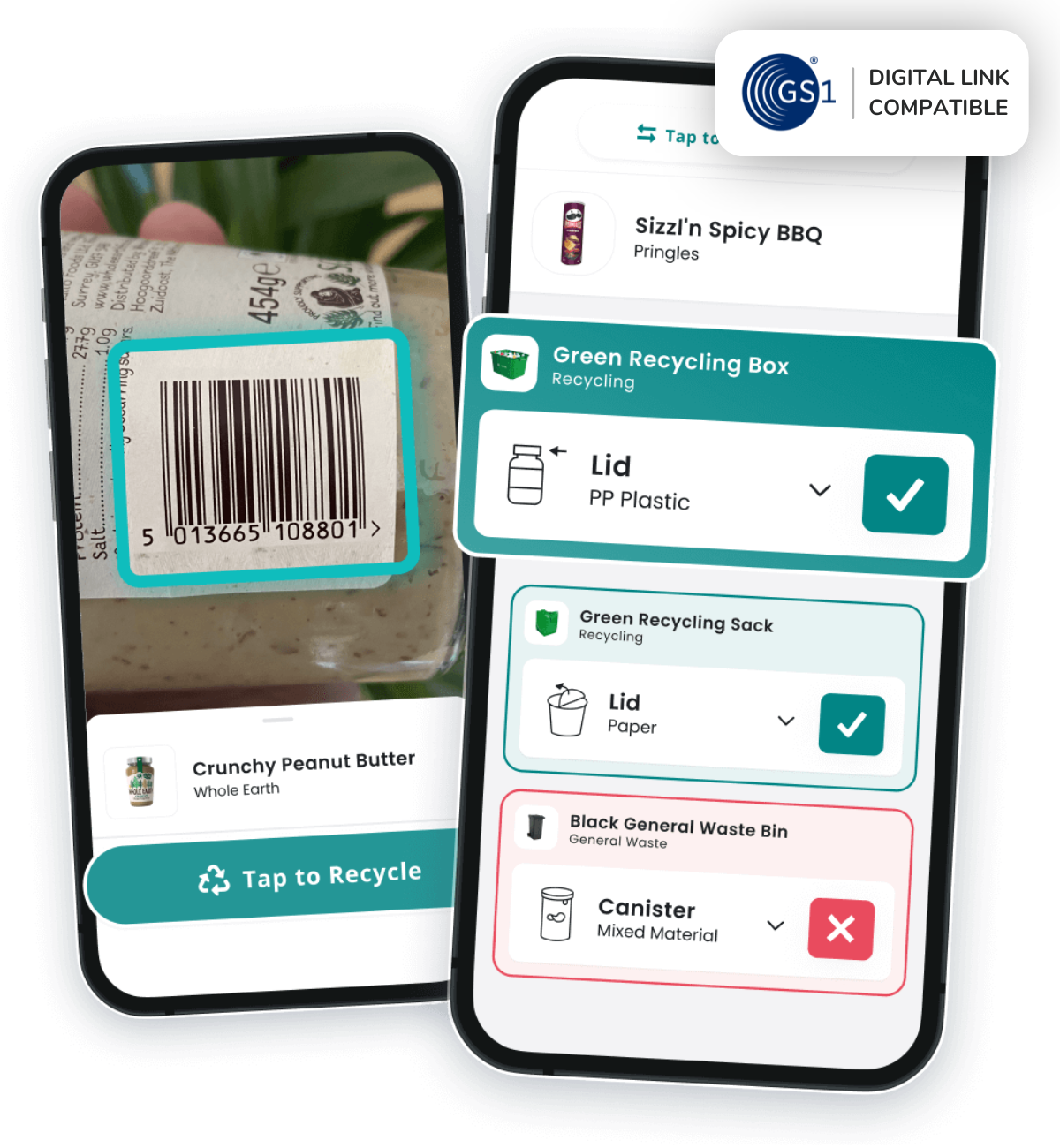.jpg)
Think of waste management software as your operational command center - it's like having a master conductor orchestrating a symphony, but instead of musicians, they're coordinating trucks, containers, and compliance reports. Just as GPS navigation evolved from paper maps to real-time traffic routing, waste management software has transformed from basic spreadsheets into sophisticated platforms that optimize routes, track assets, and ensure regulatory compliance.
But with enterprise solutions ranging from comprehensive ERPs to specialized routing platforms, which software deserves to power your operations? We've reviewed seven leading waste management software solutions to give you the honest breakdown you need. If you're looking for consumer-facing waste management apps, check out our blog post on the best recycling apps 2025.
What types of Waste Management Software are there?
Before diving into individual platforms, it's crucial to understand that waste management software falls into three main categories:
- Enterprise solutions (comprehensive platforms for private haulers and waste companies)
- Municipal solutions (designed for city and government operations)
- Hybrid solutions (serve both enterprise and municipal needs)
Waste is ubiqutious, but unique. This brings inert challenges to help varying organizations manage and measure their waste. Each software has a specific purpose depending onthemarketsegment, so it becomaes a little like choosing between a Swiss Army knife and a specialized tool, one waste management platform might not meet all your operational needs. This blog post is going to break down for you each of the waste management software solutions on the market, the pros and cons, and the best use-cases.
The Breakdown
AMCS Platform
Type: Enterprise & Municipal
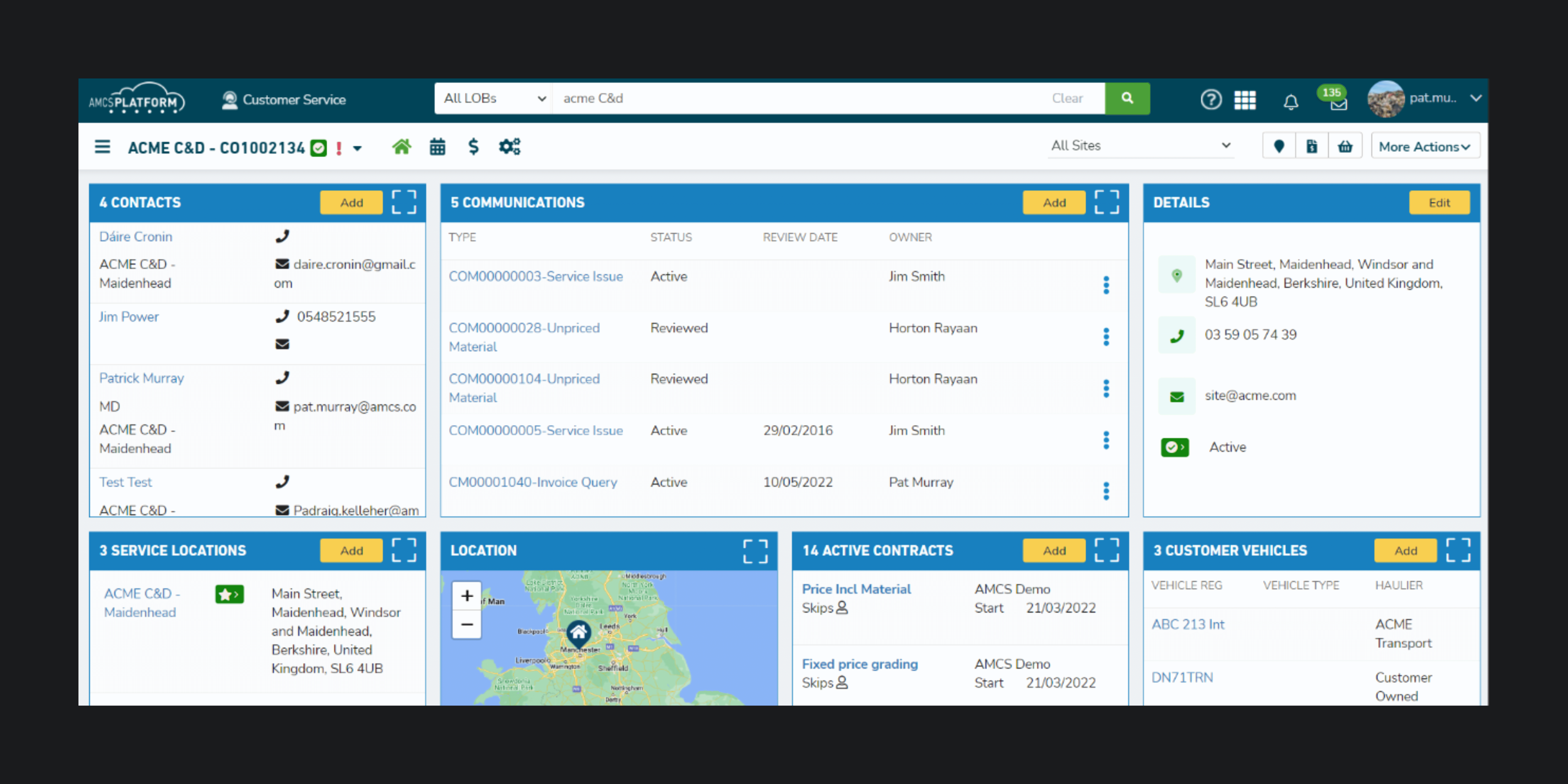
What it does: AMCS Platform is an enterprise-grade SaaS solution that connects and automates your entire waste and recycling operation. It's like having an intelligent operating system for waste management, integrating everything from customer management to route optimization in one cloud-based platform. AMCS serves over 5,000 customers globally with solutions for commercial collection, municipal operations, and hazardous substances management.
Pros:
- End-to-end integrated platform covering customer lifecycle, routing, billing, and analytics
- AI-powered contamination and overfill detection through AMCS Vision AI technology
- Scalable cloud-based architecture with mobile workforce capabilities
- Proven rapid deployment - operators can be live within four weeks
- Global presence with support teams across nine locations worldwide
- Modular design allows purchasing specific features as needed
Cons:
- Complexity may overwhelm smaller operations without dedicated IT resources
- Higher initial investment compared to point solutions
- Requires significant change management for organizations using legacy systems
- Some users report steep learning curve for advanced features
Cost: Subscription model with modular pricing
Best for: Large enterprises and municipalities seeking comprehensive digital transformation
Rubicon
Type: Enterprise & Municipal
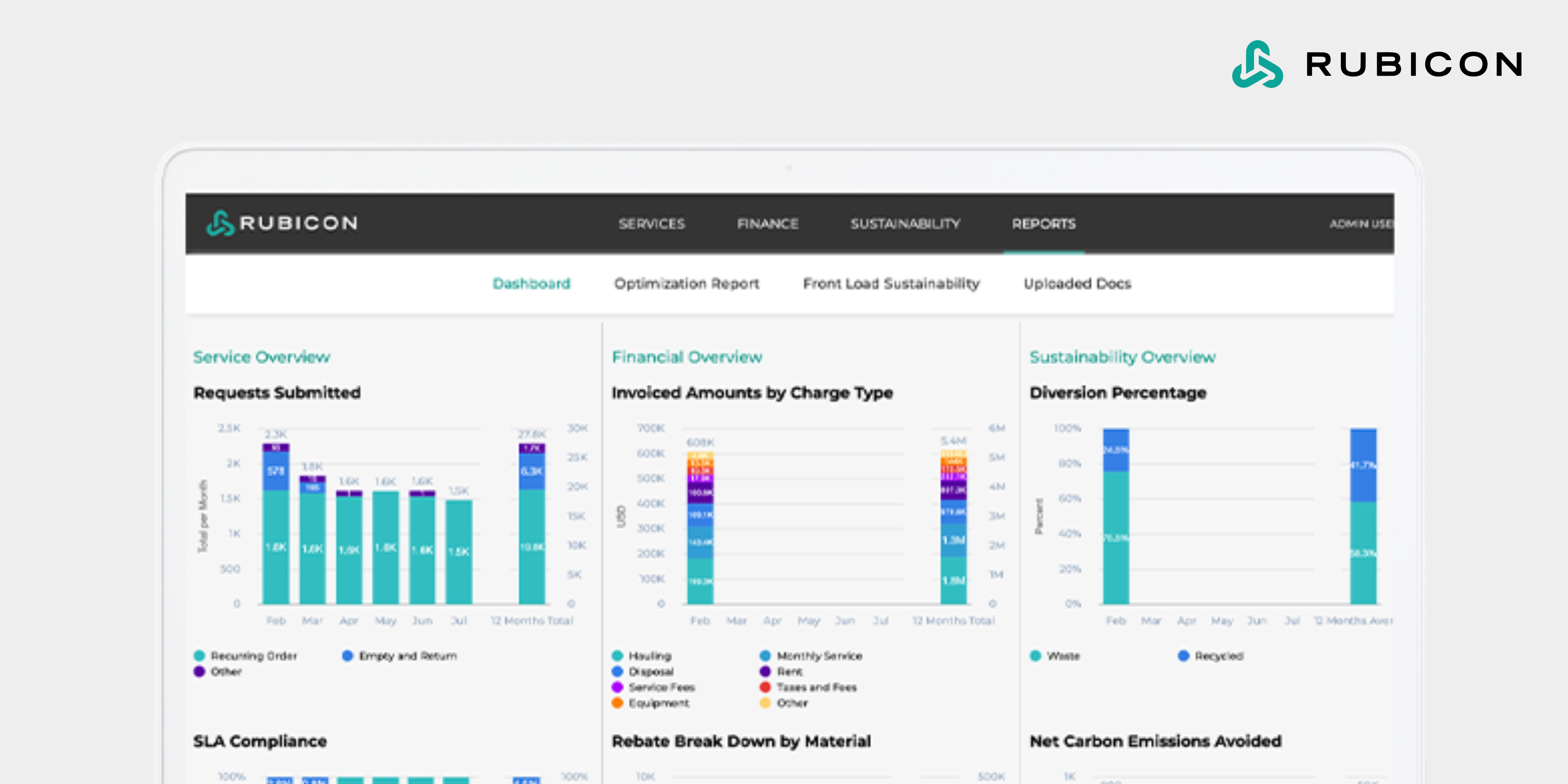
What it does: Rubicon operates as a digital transformation company providing software-based waste and recycling solutions without owning physical assets. It's like being the Uber of waste management - connecting waste generators with an extensive network of over 8,000 hauler partners through their digital platform. Rubicon serves over 100,000 service locations globally with both RUBICONSmartCity for municipalities and RUBICONPro for private haulers.
Pros:
- Asset-light model reduces overhead and increases flexibility
- Real-time data analytics and transparency across all operations
- Strong sustainability focus with detailed ESG reporting capabilities
- Operates in over 20 countries with proven scalability
- IoT integration for smart bin monitoring and route optimization
- B-Corp certified with strong social impact credentials
Cons:
- Dependency on third-party hauler network can affect service consistency
- Stock price volatility since going public via SPAC in 2022
- Some users report challenges with customer support responsiveness
- Platform relies heavily on partner ecosystem quality
Cost: Subscription-based SaaS model
Best for: Organizations prioritizing sustainability metrics and data-driven decision making
WasteHero
Type: Municipal
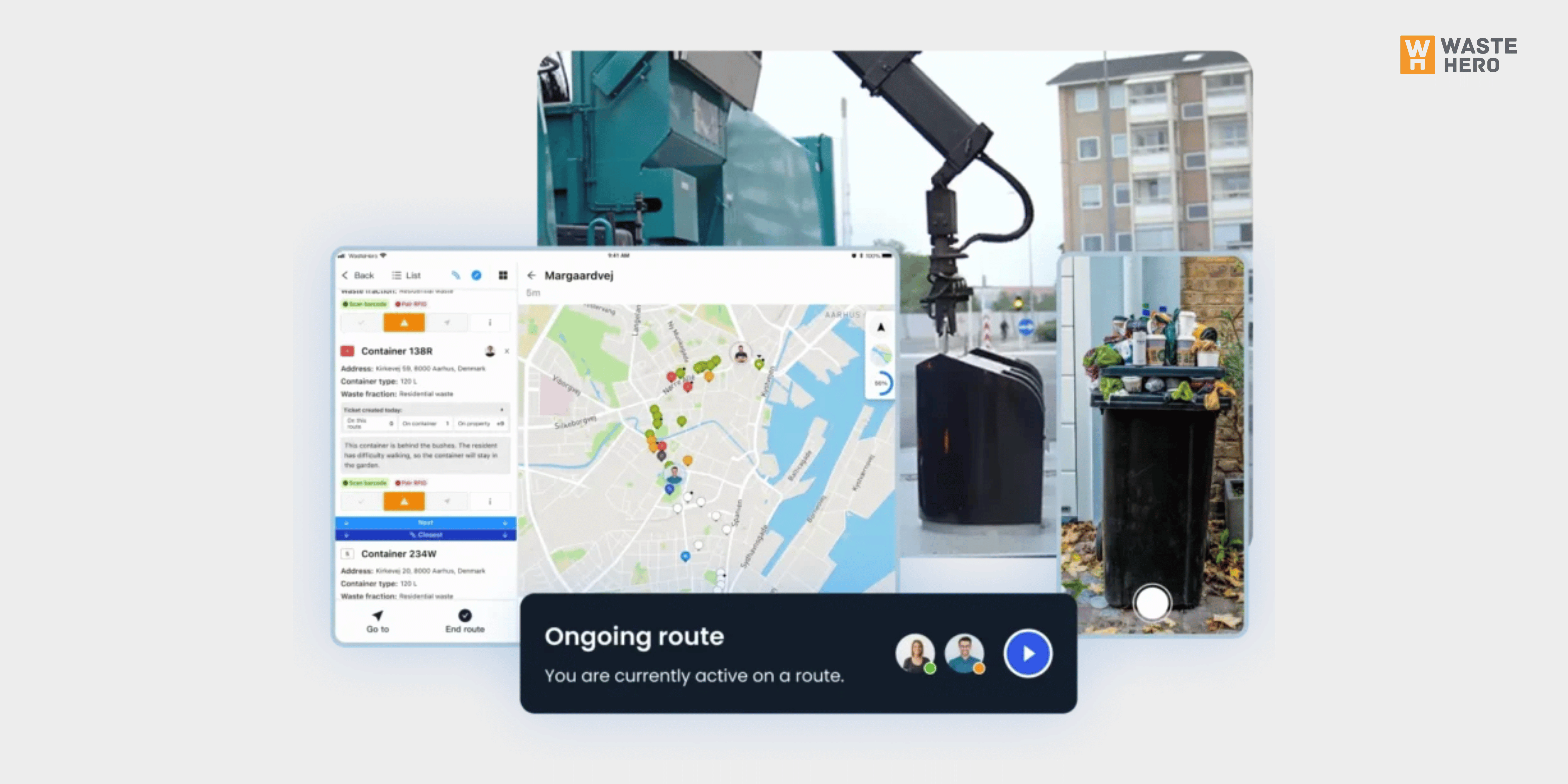
What it does: WasteHero provides a modular waste management software platform specifically designed for municipal operations and local authorities. It's like having a digital transformation toolkit that lets you pick and choose exactly what your city needs. With global offices, WasteHero serves cities with customizable solutions for route planning, citizen engagement, and operational optimization.
Pros:
- Highly customizable with mix-and-match software modules
- Reports indicate 40% reduction in total collections across waste fractions
- User-friendly interface designed for rapid onboarding (operational in days)
- Strong focus on citizen engagement with self-service portals
- Advanced route optimization using machine learning algorithms
- Seamless integration with existing third-party systems
Cons:
- Primarily focused on European markets with limited North American presence
- Newer entrant compared to established competitors
- Some features still in development for non-European regulations
- Limited case studies available for large-scale deployments
Cost: Subscription model with modular pricing
Best for: Progressive municipalities seeking flexible, modern solutions with strong citizen engagement
Waste Logics
Type: Enterprise
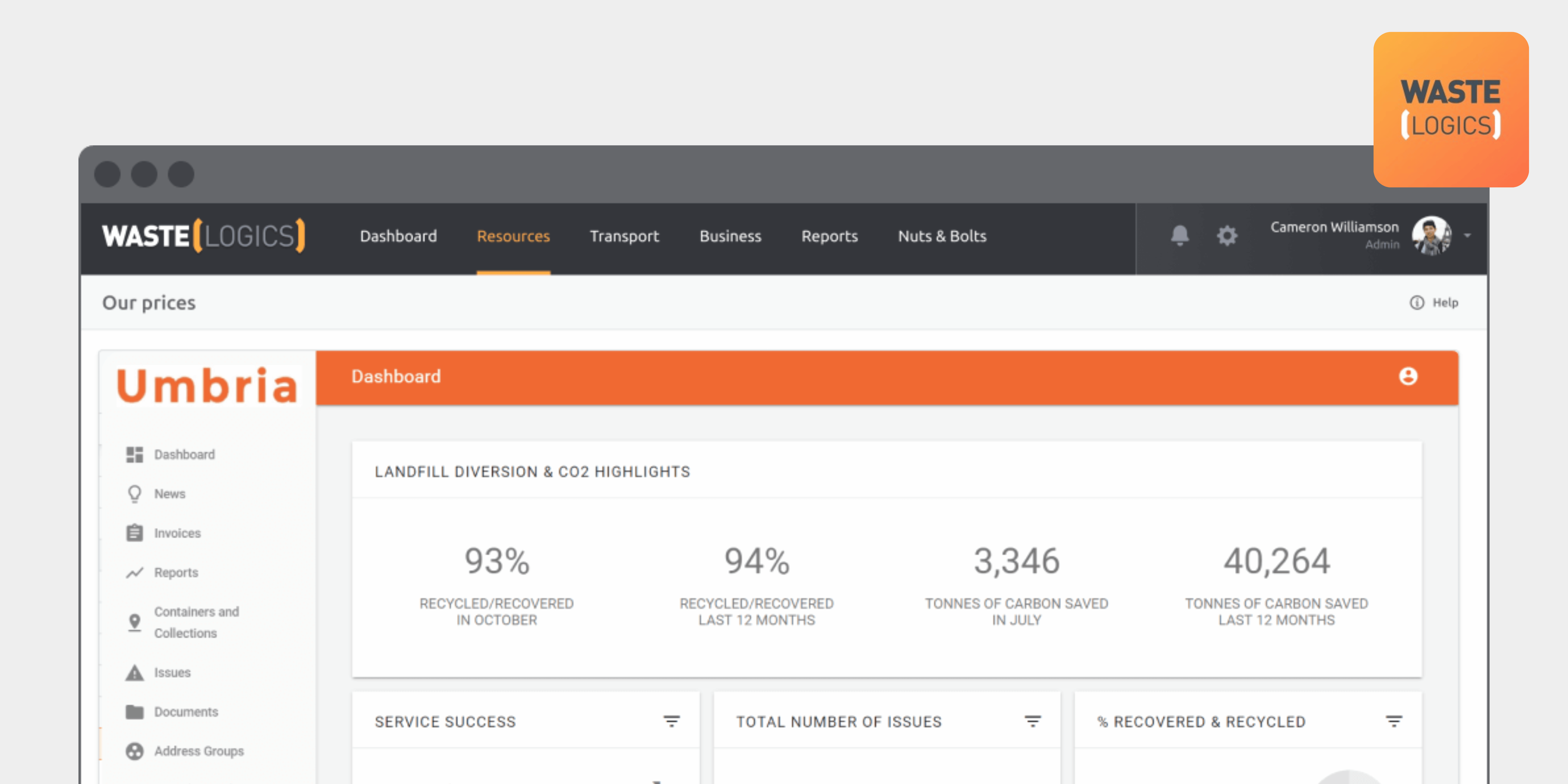
What it does: Waste Logics delivers end-to-end cloud-based waste management software covering orders, logistics, materials tracking, invoicing, and reporting. It's like having a comprehensive business management system specifically tuned for waste operations. The platform serves waste brokers, skip hire companies, recycling facilities, and trade waste businesses with intuitive dashboards and business intelligence reporting.
Pros:
- Simple, user-friendly interface with advanced functionality
- Accessible from any device with cloud-based architecture
- Strong business intelligence and reporting capabilities
- Integrates with popular accounting software like Xero
- Customizable dashboards tailored to specific job roles
- 24/7 live support available
Cons:
- Limited information about North American implementations
- Smaller market presence compared to industry giants
- Some users report occasional sync issues with third-party integrations
- May lack specialized features for complex municipal operations
Cost: Subscription-based pricing model
Best for: Small to medium waste haulers seeking comprehensive yet affordable solutions
ISB Global Waste & Recycling One
Type: Enterprise & Municipal
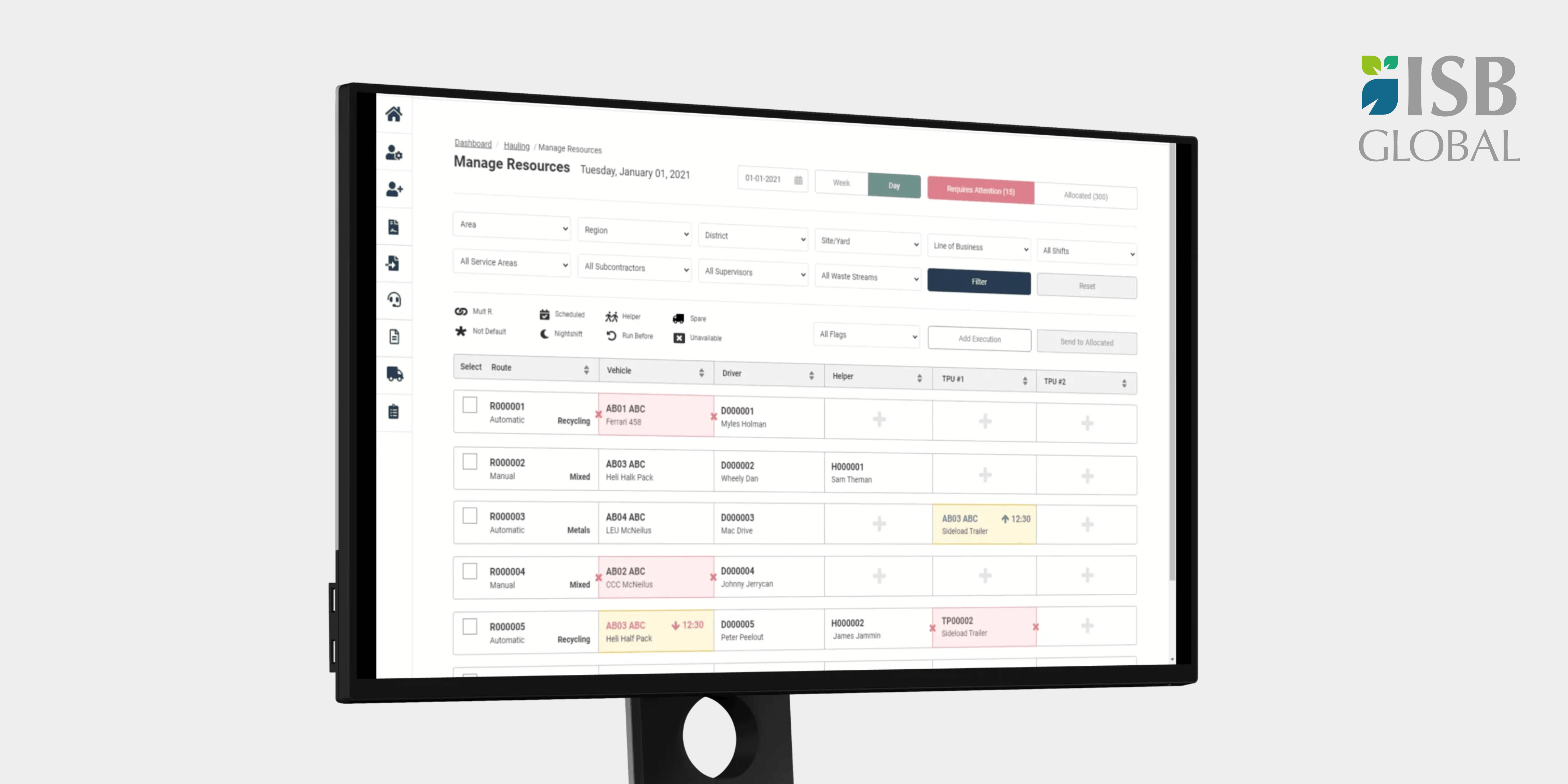
What it does: ISB Global's Waste & Recycling One (WR1) is a comprehensive SAP-integrated platform that provides enterprise-grade waste management capabilities. It's like having the power of SAP's global ERP expertise specifically configured for waste operations. As an SAP Industry Cloud certified solution, WR1 serves both large enterprises and municipalities with deep integration into existing SAP ecosystems.
Pros:
- Deep SAP integration leveraging enterprise-grade infrastructure
- Proven track record since 2005 with major waste operators
- Low-code platform allows rapid customization and development
- Comprehensive coverage from collection to material trading
- Strong presence in both Europe and expanding to North America
- Robust compliance and regulatory reporting capabilities
Cons:
- Requires familiarity with SAP ecosystem for maximum benefit
- Higher total cost of ownership for non-SAP organizations
- Implementation typically requires specialized consultants
- May be overpowered for smaller operations
Cost: Enterprise subscription model with SAP licensing
Best for: Large enterprises already using SAP or seeking enterprise-grade integration
Scrapp
Type: Enterprise & Municipal
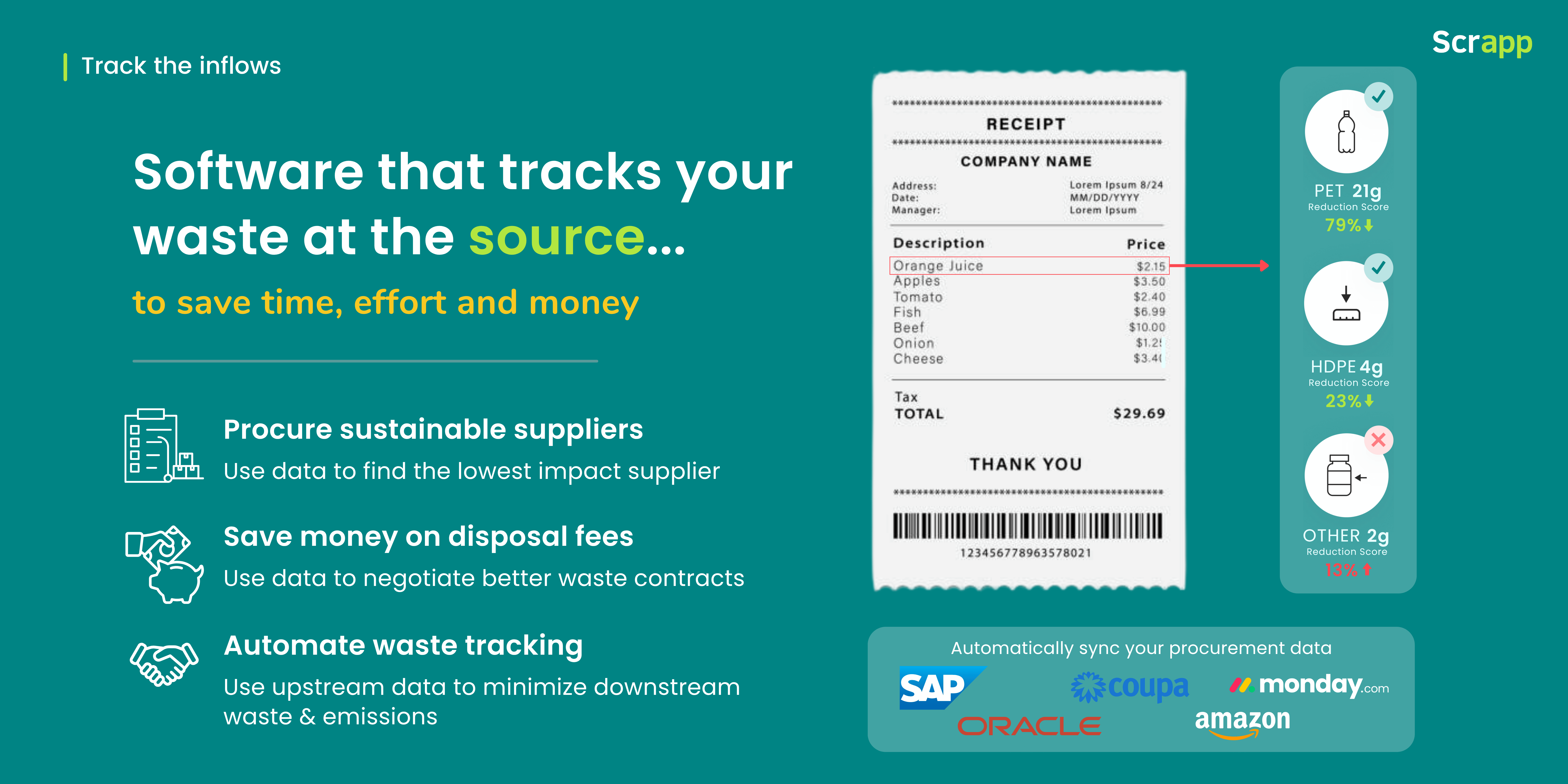
What it does: Scrapp operates as a multi-stakeholder platform that bridges the gap between consumer education and enterprise waste management. Using AI-powered, barcode-level data tracking software, Scrapp's system understand waste streams before they enter the bin. By looking upstream, organziations unlock downstream insights that generate cost savings and identify revenue generating opportunities. Paired with local waste management rules, enterprises gain valuable insights into end-of-life material values and optimize procurement for their end-market options. In its most recent update, they have expanded consumer-facing features such as bin day reminders, missed collection reporting, and gamification. Think of it as having a waste management expert that connects residents and operations teams to ensure maximum collaboration.
Pros:
- Accessible on Android, Apple, and Web platforms
- Covers 100% of UK, US, and Canada with location-based guidance
- Extensive 36M product database, 45,000+ waste drop-off points and 39,000+ waste programs existing in their system
- Removes plastic from nature through Plastic Bank partnership
- Serves multiple stakeholders (consumers, brands, municipalities)
- Microsoft-backed with strong technology foundation
- B-Corp Certified organization
Cons:
- Limited guidance outside UK/US/Canada regions
- Branding customization options limited for paying customers
- A newer innovation that has adoption barrier for waste teams
Cost: Subscription model for organizations based on buildings, free for individuals
Best for: Organizations seeking to bridge consumer education with operational insights
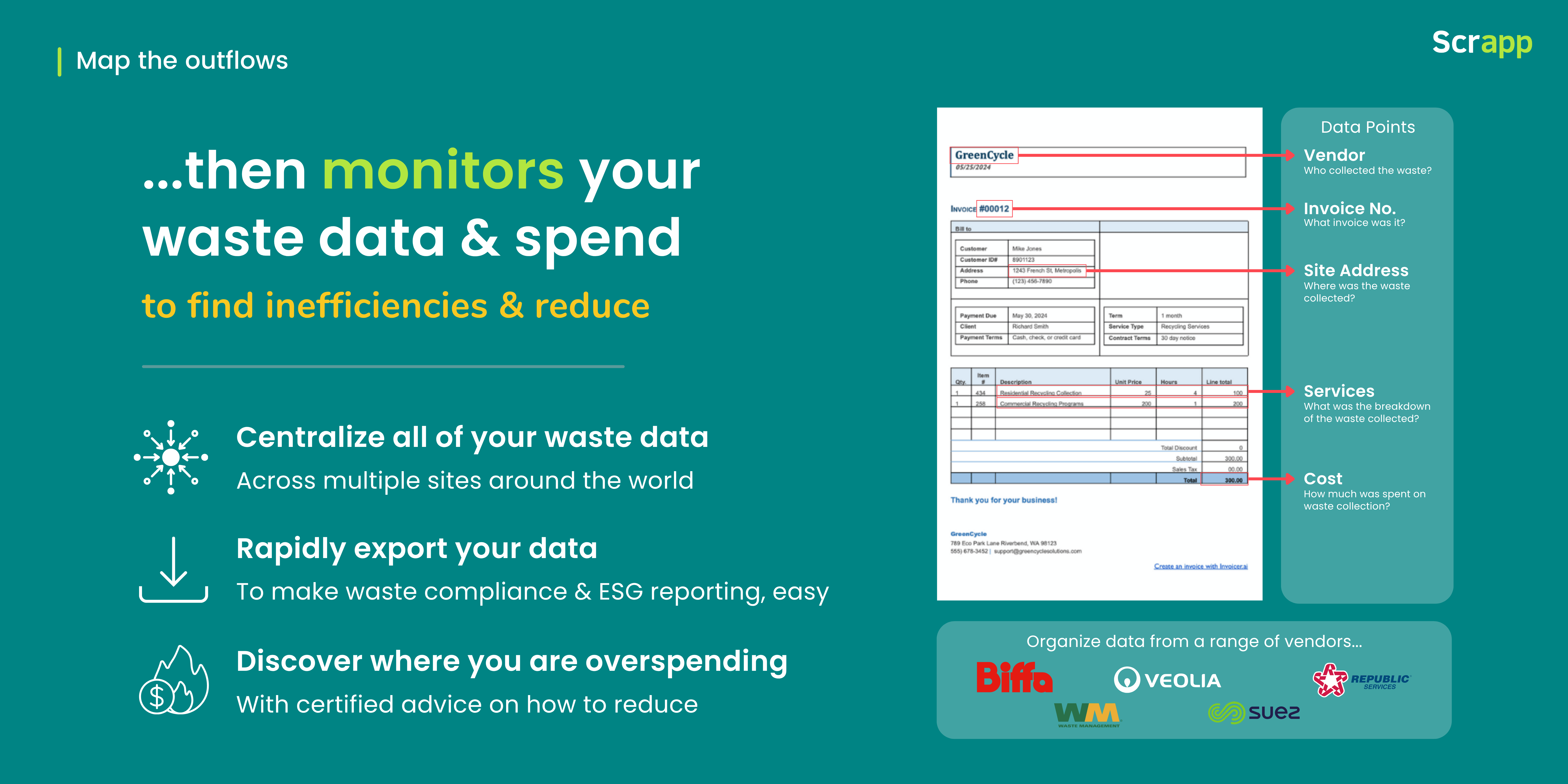
Step 3: Making Your Choice
The "best" waste management software depends entirely on your specific operational needs. It's like choosing between a Toyota -trusty andreliable, but slow. Or a Ferrari - fast and flashy, but may be overengineered for what you need. Both get you from A to B, but serve different purposes. Here's how to decide:
Choose AMCS if: You want a proven, comprehensive platform with global support and don't mind the investment in a full digital transformation.
Choose Rubicon if: Sustainability and ESG reporting are top priorities, and you prefer an asset-light, data-driven approach.
Choose WasteHero if: You're a progressive municipality wanting modern, citizen-centric solutions with flexible implementation.
Choose Waste Logics if: You're a growing hauler needing affordable, user-friendly software without overwhelming complexity.
Choose ISB Global if: You're already in the SAP ecosystem or need enterprise-grade integration capabilities.
Choose Scrapp if: You want to connect consumer education with operational intelligence across multiple stakeholders.
Step 4: The Bottom Line
Understanding how these platforms monetize reveals their strategic focus:
- AMCS: Enterprise subscriptions with modular add-ons
- Rubicon: SaaS subscriptions with marketplace commissions
- WasteHero: Municipal contracts with customization services
- Waste Logics: SMB subscriptions with integration services
- ISB Global: Enterprise licenses with SAP partnerships
- Scrapp: Building-based subscriptions for multiple stakeholders (municipalities, brands, retailers)
The funding models vary, but their interests align - they succeed when waste operations become more efficient and sustainable.
Final Recommendation
The ideal waste management software should eliminate operational headaches while providing actionable insights. Something that scales with your growth and adapts to changing regulations. From an organization's perspective, the software needs to reduce manual processes, ensure compliance, and provide clear ROI through operational efficiencies.
Whether you're looking for comprehensive enterprise solutions like AMCS, sustainability-focused platforms like Rubicon, or specialized multi-stakeholder tools like Scrapp, the options listed cover the full spectrum of operational needs.
The waste management software landscape is rapidly evolving, with AI, IoT, and predictive analytics becoming standard features. What matters most is selecting a platform that aligns with your operational maturity and growth trajectory - the best software is the one your team actually uses to drive continuous improvement.
Start with a platform that addresses your most pressing operational challenges, then expand capabilities as your digital maturity develops. After all, digital transformation is a journey, and every operational improvement begins with the right foundation.
How can Scrapp help?
Download Scrapp to see how consumer education connects with operational intelligence. If you're a municipality or enterprise looking to bridge the gap between public engagement and operational efficiency - reach out to the team to learn how Scrapp's multi-stakeholder platform can enhance your waste management programs.
